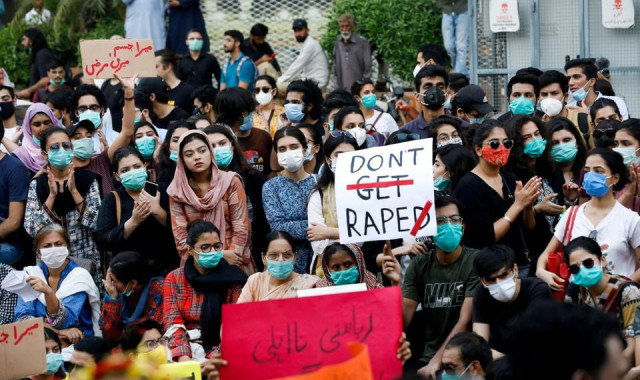Plan to chemically castrate rapists rolled back
Clause removed from bill after CCI raised objections

The federal government on Friday announced that it had rolled back the plan to chemically castrate sex offenders.
Parliamentary Secretary for Law and Justice Maleeka Bokhari said the clause providing for chemical castration of habitual rapists had been removed from the Criminal Law (Amendment) Bill, 2021, after the Council of Islamic Ideology (CII) raised objections over it.
Addressing a news conference in Islamabad accompanied by Law Minister Dr Farogh Naseem, Maleeka said the CII had described the move as “un-Islamic”.
“Article 227 of the Constitution also guarantees that all laws must be under the Shariah and the Holy Quran. Therefore, we cannot pass any law that goes against these values,” she added.
The clause was omitted from the bill before its passage in Wednesday's joint sitting of parliament after a detailed discussion by a government committee “under the guidance of the law minister”.
She said an anti-rape crisis cell would be set up in every district hospital for rapid medical examination of cases.
Maleeka added that the government had promised to protect people's rights and it had done so by introducing necessary legislation.
She said the Anti-Rape (Investigation and Trial) Bill, 2021 had been introduced to ensure swift dispensation of justice. “The previous law had flaws that hampered the provision of justice to victims.”
Read More: CII says castration ‘un-Islamic’
Chemical castration, which is carried out by the use of drugs and is reversible, can be a punishment for some sex crimes in countries including Poland, South Korea, the Czech Republic and some US states.
Prime Minister Imran Khan said last year he wanted to introduce the penalty amid a national outcry over increasing offences and the specific case of a mother of two driving along a major highway who was dragged out of her car and raped by two men at gunpoint.
Fewer than 3% of rapists are convicted in courts in Pakistan, according to the non-profit organisation, War Against Rape.
Speaking on the occasion, the law minister said the opposition lawmakers were unaware of issues of national security.
He added that the International Court of Justice (Review and Reconsideration) Bill, 2021, did not apply to Indian spy Kulbhushan Jadhav alone but to anyone who fell into that category.
“If we had not enacted the legislation, India would have filed contempt of court proceedings against us.”
The minister further said electronic voting machines (EVMs) and the conventional voting system were not flawless to the core. However, he added, analysis had revealed that the former had facets that made EVMS better than the old system.
He maintained that the Election Commission of Pakistan (ECP) was independent but it had to hold polls as per the laws passed by parliament.
The minister’s remarks came in response to the opposition’s criticism of the 33 bills, including the ones on EVMs and e-voting for overseas Pakistanis, passed in a joint sitting of parliament on Wednesday.
(With input from Reuters)



















COMMENTS
Comments are moderated and generally will be posted if they are on-topic and not abusive.
For more information, please see our Comments FAQ